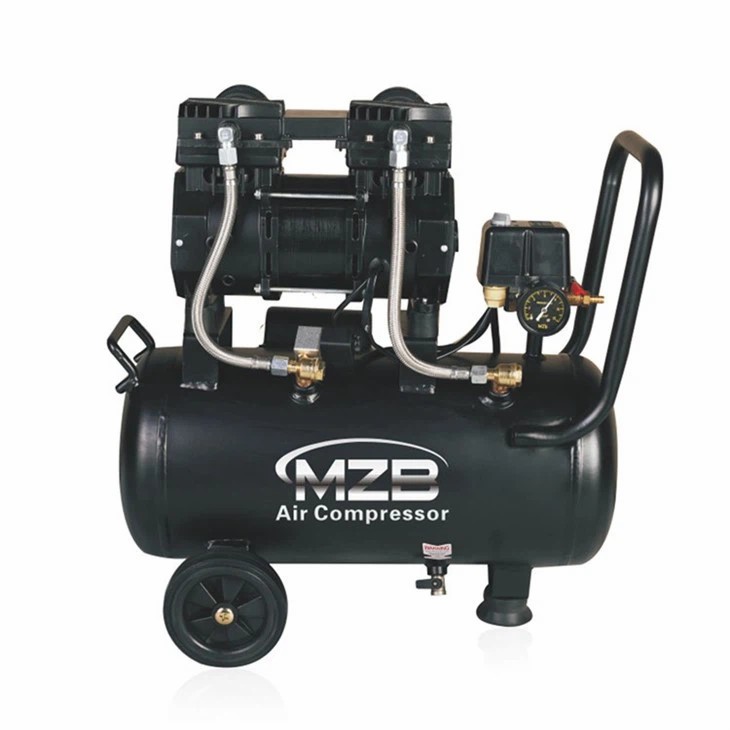Hey there! I'm an oilless air compressor supplier, and I've been in this business for quite a while. One question that often pops up is, "What is the impact of altitude on an oilless air compressor?" Well, let's dive right into it.
First off, let's understand the basic working principle of an Oilless Air Compressor. These compressors are designed to compress air without the use of oil, which makes them ideal for applications where oil contamination is a big no - no, like in the food and beverage industry, dental clinics, and electronics manufacturing.
Now, altitude plays a huge role in how these compressors perform. At sea level, the atmospheric pressure is about 14.7 pounds per square inch (psi). As you go up in altitude, the atmospheric pressure decreases. For every 1,000 feet increase in altitude, the atmospheric pressure drops by about 0.5 psi.


So, what does this mean for an oilless air compressor? Well, one of the most significant impacts is on the compressor's capacity. The capacity of an air compressor is the amount of air it can deliver at a specific pressure. With lower atmospheric pressure at higher altitudes, there is less air available for the compressor to intake. This means that the compressor has to work harder to draw in the same amount of air as it would at sea level.
Let's say you have an Oil Free Portable Air Compressor that's rated to deliver 10 cubic feet per minute (cfm) at sea level. When you take it to a higher altitude, say 5,000 feet, the atmospheric pressure is lower. The compressor will struggle to draw in as much air, and its actual delivery capacity will be reduced. It might only be able to deliver around 8 cfm or even less, depending on the design of the compressor.
Another impact is on the compressor's efficiency. Efficiency is a measure of how well the compressor converts electrical energy into compressed air energy. At higher altitudes, the compressor has to use more energy to compress the thinner air. This is because the compressor has to work against a lower pressure differential between the intake and the discharge. As a result, the compressor's power consumption increases, and its efficiency decreases.
For example, a 3 Cylinder Oil Free Air Compressor that operates at 80% efficiency at sea level might only achieve 70% efficiency at a high altitude. This means that you'll end up paying more in electricity bills to get the same amount of compressed air.
The temperature also changes with altitude. Generally, the temperature decreases as you go up in altitude. This can have both positive and negative effects on the oilless air compressor. On the positive side, cooler air is denser, which means there is more oxygen per unit volume. This can improve the combustion process in some compressors that use internal combustion engines (although most oilless compressors are electrically powered).
On the negative side, cold temperatures can cause problems with the compressor's lubrication system (even though it's oilless, there are still some moving parts that need to be protected). Cold temperatures can make the lubricants thicker, which can increase friction and wear on the compressor's components. It can also cause issues with the compressor's seals and gaskets, leading to air leaks.
In addition, the reduced air density at high altitudes can affect the compressor's cooling system. Most oilless air compressors rely on air - cooled systems to dissipate heat. With thinner air, there is less heat transfer capacity, which means the compressor can overheat more easily. Overheating can lead to premature wear and tear on the compressor's components, and in severe cases, it can even cause the compressor to fail.
So, what can you do if you need to use an oilless air compressor at a high altitude? First, you need to choose the right compressor. Make sure to select a compressor that is rated for high - altitude operation. Some manufacturers offer compressors with larger intake valves and more powerful motors to compensate for the reduced air density at high altitudes.
You also need to pay extra attention to the compressor's maintenance. Regularly check the compressor's filters, as they can become clogged more quickly at high altitudes due to the presence of more dust and debris in the thinner air. Keep an eye on the compressor's temperature and pressure gauges to ensure that it's operating within the recommended range.
If you're experiencing problems with your oilless air compressor at high altitudes, don't hesitate to contact a professional technician. They can help you diagnose the problem and make the necessary adjustments or repairs.
As an oilless air compressor supplier, I know how important it is to have a reliable compressor that can perform well in different environments. Whether you're operating at sea level or at a high altitude, we have a wide range of Oilless Air Compressor options to meet your needs.
If you're in the market for an oilless air compressor, I encourage you to get in touch with us. We can help you select the right compressor for your application and altitude requirements. Our team of experts is always ready to answer your questions and provide you with the best solutions.
In conclusion, altitude has a significant impact on the performance, capacity, efficiency, and maintenance requirements of an oilless air compressor. By understanding these impacts and taking the necessary precautions, you can ensure that your compressor operates smoothly and reliably, no matter where you are. So, if you have any questions or need help with your oilless air compressor needs, just reach out to us. We're here to help you make the most of your investment.
References:
- Compressed Air and Gas Handbook, 4th Edition
- ASME Standards on Air Compressors





